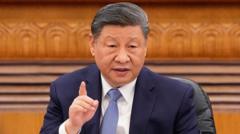As the EU prepares to engage with the U.S. in discussions concerning proposed tariffs, member states express concern over the potential fallout on their economies and industries.
**Europe Gears Up for Potential Trade War Amid Trump Tariffs**

**Europe Gears Up for Potential Trade War Amid Trump Tariffs**
Amid the announcement of sweeping tariffs by the U.S., Europe's leaders strategize for negotiations while bracing for economic repercussions.
Europe's leaders are taking stock in the wake of U.S. President Donald Trump's intention to implement a blanket tariff of 20%, echoing sentiments expressed by French Prime Minister François Bayrou, who labeled the decision "a catastrophe for the economic world." EU Commission President Ursula von der Leyen also warned that the implications could be "dire for millions of people globally." With the EU tasked with creating a cohesive response for its 27 member states, the message is clear: Europe is open to negotiations while simultaneously preparing for potential countermeasures.
EU Trade Commissioner Maros Sefcovic announced plans to engage with U.S. counterparts, seeking calm in the face of escalating tensions. "We'll act in a calm, carefully phased, unified way, as we calibrate our response," Sefcovic confirmed. National governments are acting swiftly to comfort their domestic industries, particularly in Italy where Prime Minister Giorgia Meloni convened an emergency summit to address growing concerns in the agrifood and wine sectors. Italy exports substantial amounts of wine and agrifood products to the U.S., and the potential loss of market share to competitors has sparked panic among producers.
Spain's Prime Minister Pedro Sánchez countered Trump’s claim of exorbitant EU tariffs, stating the reality was a mere 3%, criticizing the U.S. for engaging in what he termed "sterile protectionism." According to economic forecasts, a 14% drop in Spanish exports to the U.S. is currently anticipated, prompting Sánchez to introduce a €14.1 billion plan aimed at stabilizing businesses affected by the looming tariffs.
Countries like Slovakia and Poland face heightened vulnerabilities due to their economic dependencies on exports, with projections of notable GDP contractions. France’s wine industry, in particular, braced for a staggering €1 billion loss as local winemakers halted exports while awaiting clarity on potential tariffs.
Across the continent, stock markets reacted negatively to the news, with major companies suffering significant declines in value. Business owners, including Rocco Mangiaracina of a small Sicilian olive oil company, expressed frustration and uncertainty over the tariffs, yearning for potential negotiations that could alleviate the situation.
Germany criticized the tariffs as an assault on free trade and global supply systems, with acting Chancellor Olaf Scholz emphasizing EU resilience as a powerful market with 450 million consumers. The EU has indicated it may retaliate with its own tariff measures, emerging from ongoing discussions slated for late April. Initial responses could include tariffs on a broad array of agricultural and textile goods worth up to €26 billion.
As tensions mount, European officials remain focused on negotiating a peaceful resolution to avert a full-fledged trade war, with the EU holding considerable leverage, particularly concerning technology and digital services. However, Hungary's Foreign Minister criticized the EU's handling of the situation, reflecting divisions within the union. Norway, not an EU member, echoed concerns about the ramifications for its exporters, with its Finance Minister anticipating compounded economic pressures from both U.S. tariffs and EU counteractions.
The impending trade conflict poses serious risks to businesses and economies across Europe, leaving many stakeholders on edge as they await the next developments in this evolving story.
EU Trade Commissioner Maros Sefcovic announced plans to engage with U.S. counterparts, seeking calm in the face of escalating tensions. "We'll act in a calm, carefully phased, unified way, as we calibrate our response," Sefcovic confirmed. National governments are acting swiftly to comfort their domestic industries, particularly in Italy where Prime Minister Giorgia Meloni convened an emergency summit to address growing concerns in the agrifood and wine sectors. Italy exports substantial amounts of wine and agrifood products to the U.S., and the potential loss of market share to competitors has sparked panic among producers.
Spain's Prime Minister Pedro Sánchez countered Trump’s claim of exorbitant EU tariffs, stating the reality was a mere 3%, criticizing the U.S. for engaging in what he termed "sterile protectionism." According to economic forecasts, a 14% drop in Spanish exports to the U.S. is currently anticipated, prompting Sánchez to introduce a €14.1 billion plan aimed at stabilizing businesses affected by the looming tariffs.
Countries like Slovakia and Poland face heightened vulnerabilities due to their economic dependencies on exports, with projections of notable GDP contractions. France’s wine industry, in particular, braced for a staggering €1 billion loss as local winemakers halted exports while awaiting clarity on potential tariffs.
Across the continent, stock markets reacted negatively to the news, with major companies suffering significant declines in value. Business owners, including Rocco Mangiaracina of a small Sicilian olive oil company, expressed frustration and uncertainty over the tariffs, yearning for potential negotiations that could alleviate the situation.
Germany criticized the tariffs as an assault on free trade and global supply systems, with acting Chancellor Olaf Scholz emphasizing EU resilience as a powerful market with 450 million consumers. The EU has indicated it may retaliate with its own tariff measures, emerging from ongoing discussions slated for late April. Initial responses could include tariffs on a broad array of agricultural and textile goods worth up to €26 billion.
As tensions mount, European officials remain focused on negotiating a peaceful resolution to avert a full-fledged trade war, with the EU holding considerable leverage, particularly concerning technology and digital services. However, Hungary's Foreign Minister criticized the EU's handling of the situation, reflecting divisions within the union. Norway, not an EU member, echoed concerns about the ramifications for its exporters, with its Finance Minister anticipating compounded economic pressures from both U.S. tariffs and EU counteractions.
The impending trade conflict poses serious risks to businesses and economies across Europe, leaving many stakeholders on edge as they await the next developments in this evolving story.






















